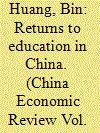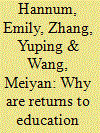|
|
|
Sort Order |
|
|
|
Items / Page
|
|
|
|
|
|
|
| Srl | Item |
| 1 |
ID:
187880


|
|
|
|
|
| Summary/Abstract |
China experienced a near 5-fold increase in annual Higher Education (HE) enrolment in the decade starting in 1999. Using the China Household Finance Survey, we show that the Great HE Expansion has exacerbated a large pre-existing urban-rural gap in educational attainment underpinned by the hukou (household registration) system. We instrument the years of schooling with the interaction between urban hukou status during childhood and the timing of the expansion – in essence a difference-in-differences estimator using rural students to control for common time trends. We find that the Great HE raised earnings by 17% for men and 12% for women respectively, allowing for county fixed-effects. These Two Stage Least Squares (2SLS) estimates, which are robust to additional controls for hukou status at birth fully interacted with birth hukou province, can be interpreted as the Local Average Treatment Effect (LATE) of education on earnings for urban students who enrolled in HE only because of the Great HE Expansion. For the selected subsample of respondents with parental education information, we find that the 2SLS returns for students from more disadvantaged backgrounds are at least as high as their more advantaged counterparts, for both genders.
|
|
|
|
|
|
|
|
|
|
|
|
|
|
|
|
| 2 |
ID:
124643


|
|
|
|
|
| Publication |
2013.
|
| Summary/Abstract |
It is well established that returns on education are higher for women than for men in urban China. We argue that this finding, while accurate, is misleading owing to its individualist perspective. The income to which most working-age women and men have access includes not only their own income, but also spouse income. Furthermore, decisions about participation and investment in the labour force, both consequential for income trajectories, are likely to be made with partner income and potential income in mind. To our knowledge, no research in China has explored the returns to education enjoyed via spouse income, or the implications of pooling couple income, for illuminating the returns to schooling difference for women and men. In this article, using data from the China Urban Labour Survey (2001), we argue that the returns for women, conventionally defined, are higher than for men because many women trade their own income for spouse income, and this is particularly true among less educated women. We demonstrate, first, that women who are more educated are less likely to get married, while the reverse is true for men. Second, we show that among couples there is evidence of a trade-off in investments in careers. Moreover, among couples, the less educated the woman and the more educated the man, the less likely the couple is to depend heavily on her income. Finally, we show that among couples there is a compensating reverse pattern of returns differences by sex when income is conceptualized as spouse income. Thus, in terms of total couple income, there are no returns differences by sex.
|
|
|
|
|
|
|
|
|
|
|
|
|
|
|
|
|
|
|
|
|